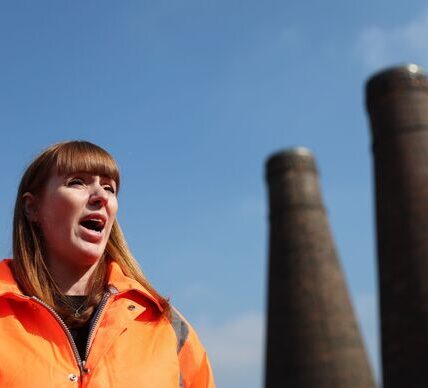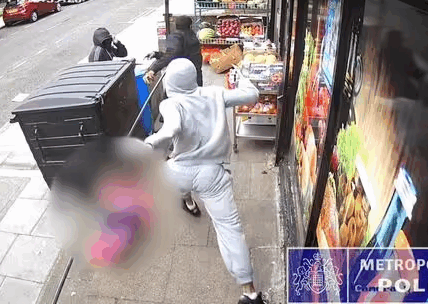The Chancellor was warned the £25 billion raid on National Insurance payments will force employers to cut staff and close parts of their businesses.

Labour’s Darren Jones was grilled on BBC Question Time (Image: BBC)
Business leaders raged at Rachel Reeves and Labour for “hiding behind them” as they hiked taxes to a record high.
The Chancellor was warned the £25 billion raid on National Insurance payments will force employers to cut staff and close parts of their businesses.
Labour pledged not to increase people’s income tax, national insurance or VAT.
But a business leader in Guildford told Chief Secretary to the Treasury, Darren Jones, on BBC Question Time: “I employ 60 people and you promised them that you wouldn’t put taxes on them.
“You put them on me, which leaves me in a position to make very difficult decisions and you’ve made me the villain of the piece.
“How could you hide behind the business owners of this country, and do that to us, whilst promising the voters that you weren’t going to raise taxes?”
Entrepreneur Sir Tom Hunter, best known for setting up Sports Division, told the panel: “There is no economy in the World that has ever taxed its way to economic growth.
“I have a friend who has got a business with 30 retail units in the UK, turning over about £40 million pounds.
“But on NI, the lowering of the threshold and increasing the rate, it’s going to cost them half a million and the new living wage is going to cost about £800,000. So that’s £1.3 million out of his profits.
“So what does he do? He said, three of my units are now not profitable. So I may need to close them.
“That means he’s going to lay off around 90 people. Let’s assume half of them find a job elsewhere. That’s 45 people who are not paying tax, who are not paying their NI, and even worse, are now asking for benefits.
“So that is not growth.”
Another employer, Janet Garcia, told the Labour politician: “I’ve been somewhat paralysed with a lack of confidence and now I have to make decisions about how much of my workforce I keep in the UK or not.”
Ms Reeves acknowledged her decision to raise national insurance contributions (NICs) for employers could affect wage growth for private sector workers as companies seek to pass on the cost of the tax rise.
The main tax rise was the £25.7 billion change to employers’ NICs, although the actual amount of money raised for the Exchequer will be around £16.1 billion by 2029/30 as firms curb wage rises, cut hours and reduce profits while public sector employers get compensation in their budgets for the change.
Economics experts branded the increase a “tax on working people” which will “definitely” show up in their wages.
Asked about the consequences of the move, the Chancellor told the BBC: “I said that it will have consequences.
“It will mean that businesses will have to absorb some of this through profits and it is likely to mean that wage increases might be slightly less than they otherwise would have been.”

Rachel Reeves has been heavily criticised for her Budget (Image: Getty)
Market jitters over the Chancellor’s plan for a massive borrowing binge sent the cost of government debt up.
Government borrowing costs leapt higher on Thursday afternoon with bond yields rising to their highest point in a year, as markets continued to digest a sharp increase in borrowing in Labour’s autumn Budget.
The yield – or interest rate – on a 10-year government bond, an indicator for the cost of state borrowing, hit 4.568% on Thursday afternoon, the highest point since August 2023.
Yields on UK government bonds, also known as gilts, move inversely to prices.
They had already moved higher on Wednesday in the wake of chancellor Rachel Reeves’ autumn Budget.
Ms Reeves announced almost £70 billion of extra spending each year, funded by business-focused tax hikes and additional borrowing.
The Office for Budget Responsibility (OBR) called it “one of the largest fiscal loosenings of any fiscal event in recent decades”.
Tories claimed the Budget amounts an extra £2,237 in tax for the average working household a year.
The analysis showed that over the next five years it would mean a total tax bill of over £9,700.
Ms Reeves defended her reforms, insisting: “This Budget was to wipe the slate clean after the mismanagement and the cover-up of the previous government.
“I had to make big choices. I don’t want to repeat a Budget like this ever again, but it was necessary to get our public finances and our public services on a stable trajectory.”
But she admitted that national insurance hikes would have an impact on pay.
“I said that it will have consequences,” she said.
“It will mean that businesses will have to absorb some of this through profits, and it is likely to mean that wage increases might be slightly less than they otherwise would have been.
“But overall the Office of Budget Responsibility forecast that household incomes will increase during this Parliament. That is a world away from the last Parliament, which was the worst Parliament ever for living standards.”
Government borrowing costs hit their highest level in a year while the pound fell by a third of a percent against the dollar.
Economists warned the government will still need to raise up to another £9 billion after next year to avoid cutting spending on unprotected departments.
Although day-to-day spending is set to rise rapidly it slows down from 2026 to 1.3%.


